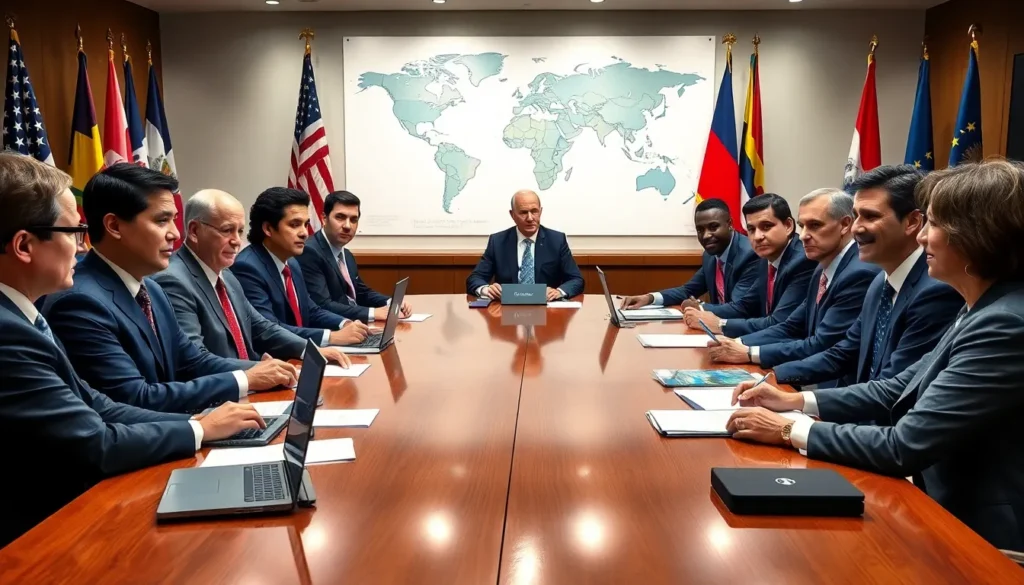In a world increasingly defined by conflict and division, international conciliation emerges as a vital tool for fostering peace and understanding among nations. This process involves mediating disputes and facilitating dialogue, aiming to resolve tensions before they escalate into violence. As global issues become more complex, the need for effective conciliation strategies has never been more pressing.
International conciliation not only addresses immediate conflicts but also lays the groundwork for long-term relationships between countries. By promoting cooperation and mutual respect, it helps build a more stable international community. Understanding the principles and mechanisms of conciliation can empower nations to navigate disputes more effectively, ultimately leading to a more harmonious world.
Table of Contents
ToggleUnderstanding International Conciliation
International conciliation involves mediating disputes to foster peace and cooperation among nations. Recognizing its principles and mechanisms plays a significant role in effective conflict management.
Definition and Importance
International conciliation refers to a voluntary process where a neutral third party assists conflicting parties in resolving their disputes through dialogue and compromise. This method’s importance lies in its capacity to de-escalate tensions, prevent violence, and promote sustainable agreements. The United Nations, among other international organizations, uses conciliation as a strategic tool to maintain global stability. By addressing underlying issues, conciliation builds long-lasting relationships and enhances cooperation, contributing to an overall peaceful international environment.
Historical Context
Historically, international conciliation has its roots in various peace treaties and agreements aimed at resolving conflicts without resorting to warfare. Notable examples include the Treaty of Westphalia (1648), which ended the Thirty Years’ War, and the establishment of the League of Nations post-World War I, aimed at fostering dialogue. The evolution of international conciliation has expanded to include formal institutions, such as the Permanent Court of Arbitration, established in 1899, that provide structured frameworks for dispute resolution. These historical foundations underscore the critical role of conciliation in shaping modern diplomatic practices and promoting international law.
Key Principles of International Conciliation

International conciliation relies on several key principles that ensure its effectiveness in resolving disputes. Understanding these principles fosters successful mediation and long-term peace between nations.
Neutrality and Impartiality
Neutrality and impartiality are fundamental to the conciliation process. Neutral third parties facilitate discussions without favoritism, creating an environment conducive to honest dialogue. Impartiality ensures that all parties receive equal consideration, which promotes trust in the process. For instance, organizations like the United Nations exemplify these principles by positioning themselves as objective mediators in international disputes.
Voluntary Participation
Voluntary participation plays a critical role in international conciliation. Parties involved must willingly engage in the process, ensuring their commitment to finding a resolution. This willingness encourages open communication and fosters cooperative problem-solving. When parties enter conciliation voluntarily, they invest in outcomes, which enhances the likelihood of durable agreements and lasting relationships.
The Process of International Conciliation
International conciliation involves structured steps and mechanisms tailored to resolve disputes effectively and foster long-term cooperation among nations.
Steps Involved
- Identification of Issues: Parties clarify the conflicts they face to ensure focus on key concerns.
- Selection of a Neutral Third Party: A mutually agreed-upon conciliator or team is chosen, emphasizing their impartiality.
- Preparation for Dialogue: Both parties prepare their positions and interests, allowing for a comprehensive understanding of the dispute.
- Conducting Meetings: The conciliator facilitates discussions, ensuring each party presents its views while promoting constructive communication.
- Exploring Solutions: Collaborative brainstorming occurs, encouraging parties to generate creative solutions that satisfy mutual interests.
- Reaching an Agreement: Once a satisfactory resolution is found, parties outline the terms in a written agreement, fostering a framework for implementation.
- Follow-Up: The conciliator may assist in monitoring the agreement’s implementation, ensuring ongoing compliance and addressing any arising issues.
Role of Conciliation Commissions
- Facilitating Dialogues: Commissions organize meetings between conflicting parties, creating a structured environment for open discussion.
- Providing Expertise: They offer specialized knowledge and experience in conflict resolution, guiding parties through complex issues.
- Drafting Recommendations: Commissions propose solutions based on the discussions, helping parties find common ground.
- Monitoring Progress: After agreements, they follow up on implementation, ensuring adherence to the terms and addressing potential challenges.
- Enhancing Credibility: The presence of a commission lends legitimacy to the process, fostering trust and encouraging cooperation among involved nations.
Challenges in International Conciliation
International conciliation faces several challenges that can hinder effective dispute resolution. These challenges often stem from cultural differences and political obstacles.
Cultural Differences
Cultural differences impede the conciliation process in numerous ways. Diverse perspectives, communication styles, and values can lead to misunderstandings. For example, direct negotiation styles may clash with more indirect approaches, creating tension. Awareness of cultural nuances is critical to fostering constructive dialogue. A lack of cultural sensitivity may cause parties to misinterpret intentions or proposals, hampering progress. Therefore, incorporating cultural awareness training for mediators and parties enhances mutual understanding and facilitates dialogue.
Political Obstacles
Political obstacles significantly challenge international conciliation efforts. Power dynamics often influence the willingness of parties to engage in meaningful discussions. For example, states with greater military or economic influence may dominate negotiations, marginalizing smaller parties’ voices. Additionally, political leaders’ differing agendas can obstruct consensus-building. Nationalism or domestic pressures may also discourage compromises, as leaders risk being perceived as weak. Effective conciliation requires navigating these political landscapes, focusing on common interests, and fostering a collaborative atmosphere for sustainable solutions.
International conciliation stands as a vital tool for fostering peace and understanding among nations. By facilitating dialogue and promoting compromise it helps prevent conflicts from escalating into violence. The structured approach of conciliation not only addresses immediate disputes but also lays the groundwork for long-term cooperation.
As nations navigate the complexities of global relations they must embrace conciliation principles to effectively manage disputes. This commitment to dialogue and understanding can lead to a more stable and harmonious international community. The evolution of conciliation practices and institutions underscores its enduring significance in shaping diplomatic relations and promoting global stability.





